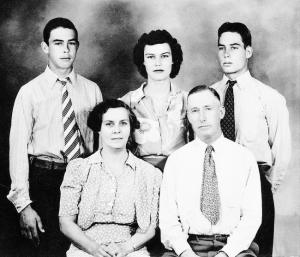A newspaper advertisement enticed the son of a Kansas chicken farmer to enroll in a new mining school in far West Texas. He became one of its first employees before being the first graduate of the Texas State School of Mines and Metallurgy, now The University of Texas at El Paso.
La Vere Leasure, the “La” being a French courtesy title, was enrolled at the College of Metals and Mineralogy in Rolla, Missouri, when he began to correspond with John W. “Cap” Kidd, the first professor of engineering at the new school set in the former El Paso Military Institute buildings located east of Fort Bliss.

Leasure already had 20 hours of chemistry credit, so he was hired as a student assistant in that subject. The upperclassman played football, basketball and baseball for the school, and was one of the first editors of the Prospector student publication, which initially was a magazine. He learned to speak Spanish from a fellow classmate and student assistant, Raul R. Barberena.
The Larned, Kansas native, born Dec. 12, 1889, is considered UTEP’s first graduate because his name was the first listed alphabetically on the May 30, 1916, commencement program and in the official records of The University of Texas System Board of Regents. His degree was in mining engineering. The other graduates from that first commencement were Clyde M. Ney, who died in a 1920 mining accident in Globe, Ariz., and Lloyd A. “Speedy” Nelson, who taught at UTEP for more than 40 years before his death in 1964.
Leasure took a job after graduation analyzing ore samples in Hillsboro, N.M., for a mine owner who would become his father-in-law. He volunteered to serve in World War I and returned to El Paso for basic training at Fort Bliss. He was assigned to an engineering corps.
After the war, he married Margaret Bell and the couple moved to Chile in 1919, where he worked as a mining engineer for four years before taking a job with the American Smelter and Refining Company. He worked as a supervising engineer in several cities in northern Mexico until he retired in 1954.
The couple had three children, Frances, James and John. James Leasure earned a bachelor’s degree in chemistry from Texas Western College (now UTEP) in 1952. Frances had three children who earned degrees from UTEP and John’s granddaughter, Linda Y. Rivas, received her bachelor’s in psychology from the University in 2008.
Rivas, managing attorney at the Las Americas Immigrant Advocacy Center, 1500 E. Yandell, said she was raised to understand her great-grandfather’s legacy at UTEP, and she appreciates it more as an alumna of the institution that celebrated its 100th anniversary in 2014.
“(Leasure) was a pioneer of higher education in El Paso and that brings me great pride,” Rivas said. She added that the university is enjoying much-deserved national exposure and that her ancestor helped pave the way. “I think it’s wonderful that we can celebrate his impact.”
She said the Leasure family has scattered around the country, but her 4-year-old son, Nicholas, is a prospective fifth-generation Miner.
Bobby Harris, Leasure’s grandson who lives on the far East side, said his grandfather did not speak much to him about his time at UTEP except for the story about how he was hired and the one about his first visit to campus.
Leasure took the day’s last trolley to the end of the line, which was near the corner of present day Dyer Street and Fred Wilson Avenue. It was dark and the student asked where the college was.
The conductor pointed to a small light in the distance.
Leasure questioned the possible natural or man-made dangers of trying to reach the school in the dark and was told the better option was to return the next day.
“Those are the only stories I remember him telling me about those days,” said Harris, a retired railroad switchman who earned his bachelor’s in English in 1970.
Leasure lived his final years quietly in Central El Paso on Justus Street near Austin High School. He spent much of his time volunteering his carpentry skills at a nearby Presbyterian church. He died of a heart attack on Oct. 26, 1966, and is buried at Fort Bliss National Cemetery.